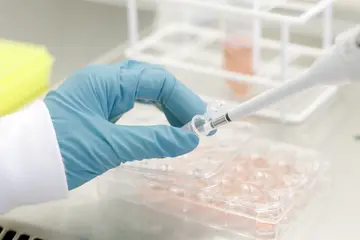Novozymes takes on climate change with ambitious targets and big investments in sustainable innovations
As a world leader in biotechnology, and with a new strategy and targets, Novozymes remains firmly committed to cutting emissions further, but new, ambitious policies are urgently needed.

November 1, 2021 – Led by President and CEO, Ester Baiget, Novozymes is attending the COP26 climate summit these weeks where world leaders will come together to discuss their latest pledges to reduce greenhouse gas emissions. With record temperatures recorded in many parts of the world, and more severe and frequent extreme-weather events, such as fires and floods, the time for action is now.
As a global leader, Novozymes is taking part in the summit to encourage ambitious actions to take on climate change. “We cannot miss this crucial opportunity for the global community to turn talk into action,” says Ester Baiget. “And as a global leader, we have a responsibility to strongly encourage and inspire stakeholders and the global community to act.”
The power of biotech can enable a healthier planet
Limiting global warming to 1.5 °C above pre-industrial levels is necessary to avoid serious impacts of climate change to the environment and human health, according to the latest report from the UN’s Intergovernmental Panel on Climate Change (IPCC). But global society is not on track. Governments and businesses must come together and take bold, decisive action – now.
As the world’s largest industrial biotechnology company, Novozymes considers the challenge as a great opportunity for change. “As a global biotech leader with clear solutions, we have the responsibility to show up, offer support and information wherever we can, and ignite change. Novozymes sits right in the middle of global needs and customer needs, and we are already working to combat climate change through innovations in industries like bioenergy, agriculture, animal and human health, alternative proteins, and new ventures such as carbon capture,” says Baiget. “We invest 13% of our annual revenue on research and development with a view to bringing groundbreaking bioinnovations to market that enable a healthier planet and healthier lives.”
The company is also firmly committed to sustainability in all aspects of the business, from the supply chain to customers, and has already been successful in reducing its environmental impact. It now sources 69% of its electricity from renewables across all sites in Denmark as well as its largest facilities in the U.S., China, and Brazil, for example. At its largest production site in Denmark, Novozymes has phased out the use of fossil fuels entirely, and as a result enabled the largest coal-fired power station in the country to transition away from coal. In the last three years, the company has also slashed its emissions from operations by 46%.
Crucial change needed
Novozymes is following up on its successes by setting new and ambitious targets that are science-based and in line with the Paris Agreement – deepening its previous commitment on climate. It is now aiming to halve its absolute carbon emissions from operations and the supply chain by 2030 and to reach carbon neutrality by 2050. The company will also switch completely to renewable electricity by 2030. “We have established our commitments to a healthy planet, which includes our pledge to speed up the transition to a climate-neutral society,” says Baiget.
Although progressive companies are taking action to help solve the climate crisis, new and more ambitious policies are needed to fully unlock and accelerate what businesses can do.
Putting a price on carbon and eliminating fossil fuel subsidies are important and significant steps that governments must spearhead. Providing incentives and support for businesses to innovate and implement new solutions are also key to drive the changes needed – at speed and scale. And finally, it is essential that the so-called Nationally Determined Contributions (NDCs), where countries propose their own goals and policies to meet the Paris Agreement, are strengthened to encourage more action – and fast.
Job potential
If the right policies are put in place, transitioning to a greener economy also holds significant potential for job creation. Shifting to renewable sources of energy could create 24 million new jobs by 2030, for example, while preserving environmental conditions should protect 1.2 billion existing jobs in sectors such as farming, fishing, and tourism. In contrast, the world’s GDP could shrink by up to 18% if no environmental action is taken, resulting in job losses.
Novozymes believes that decarbonization efforts need to occur both on a global and regional scale, and should be inclusive. “We need to ensure that a wide range of jobs are created for people with different skills,” says Baiget. “Climate efforts will only succeed if they work for everyone.”
Facts: Novozymes' presence at COP26
- Advocating for climate action as part of the International Chamber of Commerce delegation, the world’s largest business organization and the focal point for all business towards COP26 and the UNFCCC.
- Championing climate action with the United States Council for International Business and the United States government, focusing on technology for net-zero.
- Leading by example with the B Team, the global non-profit initiative co-founded by Sir Richard Branson and Jochen Zeitz, demonstrating corporate climate and sustainability leadership and engaging with key stakeholders and decision makers to shape the future.
- Collaborating with the UN Global Compact and the Science Based Targets initiative to work with peers to help move the global business community further forward from ambition to action.
- Engaging in dialogues with global media including the New York Times and with coalitions including, We Mean Business, Business Fights Poverty, and the World Economic Forum to drive change.
You can follow Novozymes’ presence at COP26 through LinkedIn and Twitter
Get in touch
Media relations



